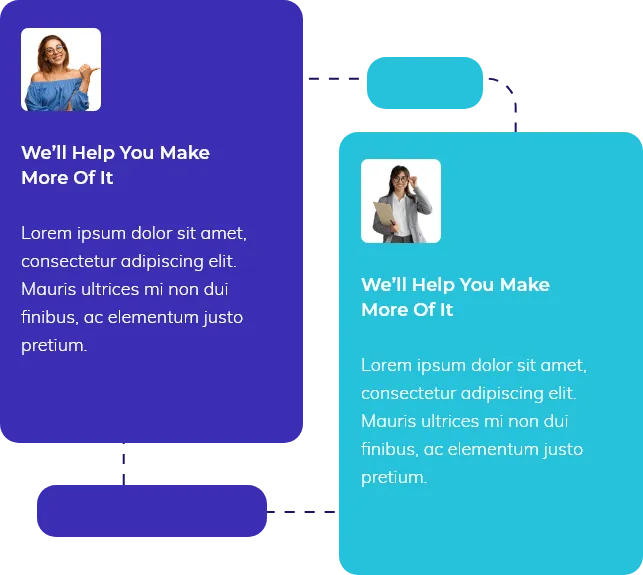


We’ll Help You Make More Of It
Committed To Helping Our Customers Succeed
Lorem ipsum dolor sit amet, consectetur adipiscing elit. Mauris ultrices mi non dui finibus, ac elementum justo pretium. Pellentesque porta elementum efficitur. Fusce nisl justo, eleifend sit amet dui in, porta ornare arcu.
Mauris ultrices mi non dui finibus, ac elementum justo pretium. Pellentesque porta elementum efficitur.
Fusce nisl justo, eleifend sit amet dui in, porta ornare arcu. Praesent eu tortor at
Trusted By Our Clients
★★★★★

Want a head start (or catch up)?
Feeling lost in the college application maze? Don't fret! Grab The College Timeline video and PDF to keep you on the path to success!
Check Out the Latest Advice

6 Mistakes When Choosing a College Major

Choosing a college major can be one of the most daunting decisions for young adults as they transition into higher education. The cloud of uncertainty looms large, and various myths and misconceptions can easily lead students astray. In this comprehensive guide, we will dispel common mistakes and provide actionable advice to help you select a major that aligns with your passions, skills, and future career prospects.
Mistake #1: Choosing a Major Too Early
It’s incredibly unfair that many colleges expect students to declare their major when they’re so young. The reality is that most students are not prepared to make such a monumental decision at this stage. As noted in our College Insights YouTube video, the first mistake students make is picking a major prematurely. This premature decision-making is often driven by college admissions processes that incentivize or require early major declarations.
By pushing students to declare a major upon application, colleges are ignoring the fundamental purpose of the undergraduate experience: exploration and discovery. Those first two years in college are meant for students to explore a variety of subjects before making a well-informed decision. Some universities are slowly shifting away from this practice, but it’s still prevalent enough to be a concern.
Students will often feel pressure from their peers, schools, and families to pick a major before they’re ready. It’s easy to think your friends have it all figured out when they’re talking about it all the time. In reality, it’s completely normal to not know what you want to major in while in high school.
Solution:
If you’re unsure about what you want to major in, look for schools that offer flexibility in switching majors. Some institutions are notably more accommodating, allowing for easier transitions between majors, particularly in the freshman and sophomore years. Before making a hasty choice, visit your prospective college’s academic advising office to understand their policies on switching majors.
Mistake #2: Choosing a Major You Struggle In
Another critical error is selecting a major in a subject where you struggle academically. While a subject may seem exciting at first, struggling through introductory courses is a red flag. The coursework will only get tougher as you advance to upper-level classes. Your chosen field should be something that comes relatively easily to you and that you find enjoyment in, at least most of the time.
Solution:
Before declaring, assess your academic strengths and weaknesses. Introductory classes serve as a litmus test. If you find a subject particularly challenging, reconsider making it your main field of study.
If you are a parent, give your child space to explore different fields, and avoid pushing too heavily into a particular subject that they struggle in.
Mistake #3: Solely Basing Your Decision on Career Prospects
Parental influence often pushes students toward majors that boast high earning potential. This is particularly prevalent in fields like computer science and engineering. However, choosing a major solely for its career prospects can lead to unhappiness and academic burnout. Our speaker recounted numerous instances where students chose majors like computer science despite disliking coding, just because of the lucrative salaries.
Unfortunately, I see many parents push their child into what they deem to be a “good major” even if their son or daughter isn’t strong in the subject. For example, I often work with students with less than a 3.5 GPA earning B’s, C’s, and even D’s in math, but their parents are pushing them into engineering. That is setting the child up for failure. From a college admissions perspective, most engineering schools won’t even consider a student with less than a 3.5 GPA and B’s in math for admission, meaning they severely limit their chances of getting into a college in the first place. Even if they could get into an engineering program with those grades, they’ll likely fail out of the program or be put in academic probation as those courses become more difficult.
Solution:
While financial stability is essential, it’s also important to find a major that you enjoy and excel in. There are numerous majors that offer both good career prospects and align with your interests and strengths. Conduct thorough research and speak to professionals in various fields to get a real-world perspective.
Mistake #4: Ignoring Career Prospects Altogether
On the flip side, some students completely overlook career prospects when choosing a major. It’s crucial to have a realistic outlook on what life post-college will look like. Career prospects vary significantly across different fields, and it’s vital to understand the financial viability of your chosen major. At the end of the day, you have to pay your bills, and you’ll need career prospects that can support that.
For instance, a student will be unsure of what they want to major in, then take a psychology class and love the topic and decide to major in psychology. However, the average psychology major makes a starting salary of about $40,000 a year, barely enough to survive on. Additionally, they don’t usually end up in a related field whatsoever.
Solution:
Consider what future career opportunities will be available with your chosen degree. If you love a subject like but are unsure about the career paths, investigate further. Most psychology majors, for instance, require further education at the graduate school level for specialized roles, and the starting salaries might not align with your financial goals. Nonetheless, if you're passionate about the field, plan your educational journey accordingly by aiming for higher qualifications that have better career prospects.
Mistake #5: Choosing Based on a Favorite Professor
It’s common for students to be influenced by a charismatic or engaging professor, leading them to choose a major based on this temporary inspiration. While having excellent professors is amazing, it’s crucial to remember that not all professors will be equally inspiring.
Solution:
Separate the subject from the professor. Make sure that the field you are choosing fascinates you regardless of who is teaching it. Once you’re confident that you enjoy the subject matter itself, your decision will be more sound.
Mistake #6: Failing to Understand Real-World Applications
Lastly, failing to understand what a major entails in the real world can be a significant pitfall. Many students have a vague idea of what professionals in their chosen field actually do on a daily basis. This lack of understanding can lead to disillusionment and regret.
Solution:
Conduct informational interviews, internships, and job shadowing to gain real insight. For instance, engineering encompasses many sub-disciplines, each with unique roles and responsibilities. If you want to be an engineer, what kind of engineer? Civil, mechanical, aeronautical, industrial, electrical, structural, petroleum?
A mechanical engineer working for NASA will have a vastly different experience than one working in HVAC systems. Understanding these nuances will better prepare you for your future career.
Choosing a college major doesn’t have to be a stressful or hasty decision. By being aware of these common mistakes and taking proactive steps to explore your options, you can find a major that aligns with both your interests and career goals.
If you’re still unsure about which major to choose, our free guide (need to link) on selecting a college major can be an excellent starting point. It offers a structured exercise to provide you with a direction based on your interests and goals.
Remember, the goal is to find a balance that will lead to both personal satisfaction and career success. The journey of discovering your ideal major is a significant part of your college experience, so take your time and make an informed decision.
By being conscientious and informed, you can navigate the maze and find a path that is uniquely suited to your future aspirations.
For even more helpful information, be sure to check out the detailed video I’ve created! 🎥 It dives deeper into the topic and includes additional insights that may help you. Click here to Watch!

As Featured In










Elisia's Top Picks

6 Mistakes When Choosing a College Major

Choosing a college major can be one of the most daunting decisions for young adults as they transition into higher education. The cloud of uncertainty looms large, and various myths and misconceptions can easily lead students astray. In this comprehensive guide, we will dispel common mistakes and provide actionable advice to help you select a major that aligns with your passions, skills, and future career prospects.
Mistake #1: Choosing a Major Too Early
It’s incredibly unfair that many colleges expect students to declare their major when they’re so young. The reality is that most students are not prepared to make such a monumental decision at this stage. As noted in our College Insights YouTube video, the first mistake students make is picking a major prematurely. This premature decision-making is often driven by college admissions processes that incentivize or require early major declarations.
By pushing students to declare a major upon application, colleges are ignoring the fundamental purpose of the undergraduate experience: exploration and discovery. Those first two years in college are meant for students to explore a variety of subjects before making a well-informed decision. Some universities are slowly shifting away from this practice, but it’s still prevalent enough to be a concern.
Students will often feel pressure from their peers, schools, and families to pick a major before they’re ready. It’s easy to think your friends have it all figured out when they’re talking about it all the time. In reality, it’s completely normal to not know what you want to major in while in high school.
Solution:
If you’re unsure about what you want to major in, look for schools that offer flexibility in switching majors. Some institutions are notably more accommodating, allowing for easier transitions between majors, particularly in the freshman and sophomore years. Before making a hasty choice, visit your prospective college’s academic advising office to understand their policies on switching majors.
Mistake #2: Choosing a Major You Struggle In
Another critical error is selecting a major in a subject where you struggle academically. While a subject may seem exciting at first, struggling through introductory courses is a red flag. The coursework will only get tougher as you advance to upper-level classes. Your chosen field should be something that comes relatively easily to you and that you find enjoyment in, at least most of the time.
Solution:
Before declaring, assess your academic strengths and weaknesses. Introductory classes serve as a litmus test. If you find a subject particularly challenging, reconsider making it your main field of study.
If you are a parent, give your child space to explore different fields, and avoid pushing too heavily into a particular subject that they struggle in.
Mistake #3: Solely Basing Your Decision on Career Prospects
Parental influence often pushes students toward majors that boast high earning potential. This is particularly prevalent in fields like computer science and engineering. However, choosing a major solely for its career prospects can lead to unhappiness and academic burnout. Our speaker recounted numerous instances where students chose majors like computer science despite disliking coding, just because of the lucrative salaries.
Unfortunately, I see many parents push their child into what they deem to be a “good major” even if their son or daughter isn’t strong in the subject. For example, I often work with students with less than a 3.5 GPA earning B’s, C’s, and even D’s in math, but their parents are pushing them into engineering. That is setting the child up for failure. From a college admissions perspective, most engineering schools won’t even consider a student with less than a 3.5 GPA and B’s in math for admission, meaning they severely limit their chances of getting into a college in the first place. Even if they could get into an engineering program with those grades, they’ll likely fail out of the program or be put in academic probation as those courses become more difficult.
Solution:
While financial stability is essential, it’s also important to find a major that you enjoy and excel in. There are numerous majors that offer both good career prospects and align with your interests and strengths. Conduct thorough research and speak to professionals in various fields to get a real-world perspective.
Mistake #4: Ignoring Career Prospects Altogether
On the flip side, some students completely overlook career prospects when choosing a major. It’s crucial to have a realistic outlook on what life post-college will look like. Career prospects vary significantly across different fields, and it’s vital to understand the financial viability of your chosen major. At the end of the day, you have to pay your bills, and you’ll need career prospects that can support that.
For instance, a student will be unsure of what they want to major in, then take a psychology class and love the topic and decide to major in psychology. However, the average psychology major makes a starting salary of about $40,000 a year, barely enough to survive on. Additionally, they don’t usually end up in a related field whatsoever.
Solution:
Consider what future career opportunities will be available with your chosen degree. If you love a subject like but are unsure about the career paths, investigate further. Most psychology majors, for instance, require further education at the graduate school level for specialized roles, and the starting salaries might not align with your financial goals. Nonetheless, if you're passionate about the field, plan your educational journey accordingly by aiming for higher qualifications that have better career prospects.
Mistake #5: Choosing Based on a Favorite Professor
It’s common for students to be influenced by a charismatic or engaging professor, leading them to choose a major based on this temporary inspiration. While having excellent professors is amazing, it’s crucial to remember that not all professors will be equally inspiring.
Solution:
Separate the subject from the professor. Make sure that the field you are choosing fascinates you regardless of who is teaching it. Once you’re confident that you enjoy the subject matter itself, your decision will be more sound.
Mistake #6: Failing to Understand Real-World Applications
Lastly, failing to understand what a major entails in the real world can be a significant pitfall. Many students have a vague idea of what professionals in their chosen field actually do on a daily basis. This lack of understanding can lead to disillusionment and regret.
Solution:
Conduct informational interviews, internships, and job shadowing to gain real insight. For instance, engineering encompasses many sub-disciplines, each with unique roles and responsibilities. If you want to be an engineer, what kind of engineer? Civil, mechanical, aeronautical, industrial, electrical, structural, petroleum?
A mechanical engineer working for NASA will have a vastly different experience than one working in HVAC systems. Understanding these nuances will better prepare you for your future career.
Choosing a college major doesn’t have to be a stressful or hasty decision. By being aware of these common mistakes and taking proactive steps to explore your options, you can find a major that aligns with both your interests and career goals.
If you’re still unsure about which major to choose, our free guide (need to link) on selecting a college major can be an excellent starting point. It offers a structured exercise to provide you with a direction based on your interests and goals.
Remember, the goal is to find a balance that will lead to both personal satisfaction and career success. The journey of discovering your ideal major is a significant part of your college experience, so take your time and make an informed decision.
By being conscientious and informed, you can navigate the maze and find a path that is uniquely suited to your future aspirations.
For even more helpful information, be sure to check out the detailed video I’ve created! 🎥 It dives deeper into the topic and includes additional insights that may help you. Click here to Watch!


I was very impressed with this course and list of scholarships it provides. The lists of scholarships are up to date, active and available. This not only saved me hours of my own time trying to look up scholarships I qualify for but, it also provided a list of scholarships I would have never found on my own. Major plus is Elisia provided a comprehensive list of scholarships for people of color. Thank you Elisia!
★★★★★
Carlo L

This resource is a boon for students searching for financial aid, as it categorizes scholarships by accessibility—focusing on those that are easy to apply for, do not require a GPA, or have no income requirements. What makes this resource stand out is the meticulous attention to detail. Elisia has evidently put a lot of effort into compiling a list that is not only extensive, but also easy to navigate, making the often daunting task of finding scholarships much more manageable.
★★★★★
Robert B
Have no idea what you’re doing?
Check out our courses to get step-by-step guidance on every aspect of the college admissions process.

Want one-on-one support?
Schedule a consultation.
© 2024 College Insights®. All Rights Reserved.
All written content on this site is for information purposes only. Opinions expressed herein are solely those of Elisia Howard, unless otherwise specifically cited. Material presented is believed to be from reliable sources and no representations are made by our firm as to another parties’ informational accuracy or completeness. All information or ideas provided should be discussed in detail with an advisor, accountant, or legal counsel prior to implementation.
All third-party trademarks, including logos and icons, referenced in this website, are the property of their respective owners. Unless otherwise indicated, the use of third-party trademarks herein does not imply or indicate any relationship, sponsorship, or endorsement between College Insights® and the owners of those trademarks. Any reference in this website to third-party trademarks is to identify the corresponding third-party goods and/or services.
